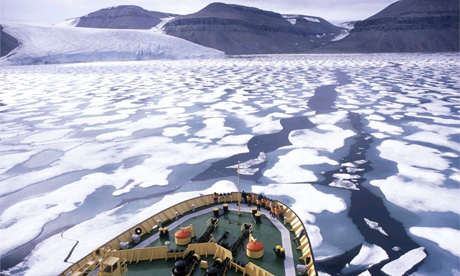The Northwest Passage has long been fabled by explorers and businessmen as a better alternative to the existing international shipping routes of Suez and Panama. With the Nordic Orion, a Danish vessel carrying 73,000 tons of coal from Vancouver to Finland, successfully becoming the largest vessel to first use the Passage as a commercial route on September 27, 2013, the dream of the widespread use of the Northwest Passage is moving ever closer to reality.
The regular use of the Northwest Passage is not without criticism, however. The thickness of the ice changes with the seasons, preventing the route from being used all year round. Current shipping vessels are also not equipped to handle the ice sheets, and fleets would have to undergo large and expensive transformations to make them viable to travel in the region. In the foreseeable future, the route is predicted to still only to be economically viable for certain commodities, including coal, oil, gas, copper and nickel. Despite these concerns, Canada must be prepared for the opening of the Northwest Passage to high volume commercial trade in order to best tackle some of the economic, environmental, political and security implications as outlined in this article.
Economic Implications
The increased trade in the north due to the thinning of ice would be especially beneficial to Canada, as well as contribute to international prosperity due to the reduction of costs associated with the time saved from alternative travel routes. The Nordic Orion was able to save an estimated $80,000 worth of fuel as well as a week’s worth of travel time. Travelling via the Northwest Passage would reduce travel time from Asia Pacific’s coast to Western Europe by a third.
[captionpix align=”right” theme=”elegant” width=”300″ imgsrc=”http://natoassociation.ca/wp-content/uploads/2013/11/5-northwest-passage-pic.jpg” captiontext=”The North West Passage offers a much shorter route between Asia, Europe and North America”]
Domestically, the increased volume of trade in the area could serve to be beneficial to the Inuit communities in Northern Canada. Currently, residents in the region pay astronomical amounts for basic necessities because of the transportation costs, and it can be conceived that increased interaction with the area would bolster both the economy and the supply of goods.
Environmental Implications
The European Space Agency predicted in 2012 that the ice is thinning at 50% faster than scientists had anticipated. Even greater reduction of ice is a highly likely scenario, considering the combination of effects caused by a rise of carbon dioxide (CO2) emissions, the albedo effect and the positive feedback loop issue of decreased benefits the arctic provides. The arctic ice traps methane, a potent greenhouse gas, which when melted will release the chemical into the atmosphere.
Assuming that no action will be taken to reduce the speed of the Arctic melt, there is still some potential for a reduction of environmental costs. Aside from reducing shipping times, the Northwest Passage also provides an opportunity to reduce CO2 emissions through shorter transportation times. Canada should take this into consideration, and promote the use of more energy-efficient icebreakers. Technological advances have also allowed nuclear icebreakers to offer a chance to reduce environmental costs.
Finally, the threat of oil spills in the Arctic is also very pertinent due to the largely varying and delicate arctic environment, so Canada should learn from past mistakes to identify measures which can be put in place to avoid this issue. Some years ago, the Exxon Valdez spilled over eleven million gallons of oil along the Alaskan coastline, and cost over $3.5 billion in cleanup costs. Even though Exxon was charged with the burden of paying these costs, American taxpayers still had to foot the legal bills and assist with the costs associated with the immediate cleanup of the incident. Canada must recognize the monetary and opportunity costs associated with potential oil spills and invest in preventative techniques.
Political Implications
The Northwest Passage also has strong political implications in the area of diplomatic relations with other countries. Most notably, it is imperative that Canada work with the United States in the co-ordination of arctic security for the route to protect their common border in the arctic. However, Canada should not rely entirely on the United States for defense in the region despite the US having a superior military. The Northwest Passage is largely, if not entirely, in Canada’s jurisdiction, and to create faster response times, co-operation and open dialogue is needed for a joint strategy in the arctic.
Due to the foreseeable growth in wealth from the opening of the arctic, other countries have tried to lay claim to the region. As a result, Canada’s participation in the United Nations Convention on the Law of the Sea and its associated body of the International Maritime Organization has never been more important. Furthermore, the Canadian Chairmanship of the Arctic Council until 2015 provides a unique political opportunity for policymakers to collaborate on determining response mechanisms to crises as well as developing networks for shared learning in the arctic.
While all these foreign policy considerations are vital, it is especially important to consider the welfare of the Inuit living in the region. Traditional hunting and trapping will be negatively disrupted with the rise of international shipping in the region. While it is true that there will be an increase of job opportunities, it will only be suitable for those with the right set of skills. The Inuit can provide crucial knowledge in assisting the economic, environmental and security developments of the region through their long history in the region and their expertise. It is therefore paramount that decisions about the Northwest Passage and the north be made with the Inuit in mind.
Security Implications
The increase in activity in the arctic region necessitates a buildup of northern security. Canada has done relatively well to recognize this concern, having spent money on developing a stealth snowmobile for the Canadian Forces, working with the US in NORAD, and beginning the development of the Canadian Forces Arctic Training Centre. However, there is a lack of sufficient resources to the Canadian Forces, most notably the failure to replace the 60 year old rifles currently used by the Canadian Rangers. Canada also needs more icebreakers for the Canadian Coast Guard, an essential part in protecting the Northwest Passage and its waters. Canada must consider practical investments for the military in the arctic as one of their biggest budget concerns for the next fiscal years.
Conclusion
In light of these implications resulting from the ground-breaking trip by Nordic Orion, the successful voyager should be considered to be a wakeup call for Canada to consider important economic, environmental, political and security implications about their region in the arctic. It is vital that Canada take these considerations into account when discussing future policy decisions of the region.




